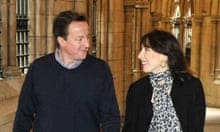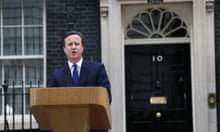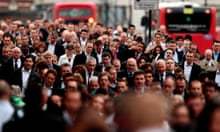Any list of the people that matter in this tightest of elections would include Paul Johnson. Few voters would be able to identify him, but the director of the Institute for Fiscal Studies is up there with David Cameron, Ed Miliband, Nick Clegg, Nigel Farage, Natalie Bennett and Nicola Sturgeon. He is a man who counts.
Johnson matters because the IFS is seen as the ultimate arbiter on a range of issues that will have a bearing on the result on polling day: government spending totals, tax, the size of the budget deficit and living standards. In short, whether the plans of the Conservatives, Labour and the Liberal Democrats stack up.And it didn’t take long for the IFS to be called into action. When Cameron formally launched the Conservative election campaign today with a claim that Labour would raise taxes by £3000 for every household, Johnson said it was “unhelpful”. An instant bit of IFS number-crunching concluded that Labour was planning nothing of the sort.
It is not the first time that the prime minister has had his knuckles rapped. Earlier this year when the Conservatives posted a video on YouTube attacking Labour. It selectively quoted remarks Johnson had made about what shadow chancellor Ed Balls’s spending plans meant for the deficit and the national debt.
The rationale was simple: voters trust the IFS more than they do politicians. Johnson, though, was unamused. The IFS prides itself on being unaligned. He called on the Tories to take the video down, which they did.
“It was irritating,” he says, adding that both sides do it. “They like to quote our numbers at prime minister’s questions. I don’t get too upset about it. My default response is to let it wash over.”
Johnson is looking forward to the election. “It is politically exciting. Nobody knows who is going to win, unlike some recent elections. There are significant differences between the parties but an awful lot we don’t know.”
The IFS is not without its critics and has been attacked from both left and right. But when Johnson passes judgment during the election campaign, it would be a brave politician to stand up and say the IFS is wrong. Johnson says the IFS’s credibility is the reason he is taken seriously and that he gets a “buzz” from knowing that people listen when he has done an instant analysis of something the chancellor or shadow chancellor has said.
“We never publish something unless it is based on empirical analysis,” Johnson says, adding that the IFS sees itself as a research organisation rather than a thinktank. “We don’t just think things.”
Johnson says he feels responsible in two ways. “I feel responsible to the IFS. It’s a very important and precious organisation so if I mess up, I mess up for the the IFS.
“But it is terribly important for the public debate that what we say is absolutely correct. The danger is that we will inadvertently cast something in a light that we don’t intend to. But we are careful. We don’t blog and we don’t tweet, apart from to say that we have a report out. We say no to press interviews more often than we say yes. Press releases are read and altered by at least two people. That reduces the chances that we will say something wrong or unbalanced.”
Johnson studied PPE at Oxford University between 1985 and 1988, when his tutorial partner at Keble College was Balls. Both got firsts.
What did you make of him? “I probably shouldn’t comment,” Johnson says diplomatically.
Johnson was recruited to the IFS straight from Oxford, working his way up to be deputy director over the next decade before leaving to join the Financial Services Authority. He later moved to the Department for Education and had three years at the Treasury while Gordon Brown was chancellor. He spent three and a half years at the consultancy Frontier Economics before returning – “without a moment’s hesitation” – to run the IFS.
“I love the IFS. I love what it does and I love the way it does it. I think it’s a very important organisation in terms of what it does.”
Asked whether the political parties ever try to lean on the IFS, Johnson says: “We get the odd casual call, text or email, but so far nothing much.” Since Johnson arrived at the IFS at the start of 2011, he says he has been lobbied perhaps a couple of times a year by each of the parties.
“They may say that we could have said something better or that we have misunderstood something. But I can’t think of an occasion when I thought we had got it wrong.”
The IFS has almost 40 full-time research economists. It recruits almost exclusively final-year undergraduates or those studying for masters degrees. “We train them, partly in economics and partly in the ways of the IFS.”
“People come here because they are interested in the sorts of things we are doing. Everyone here could have gone and got a job in the City when they graduated but they chose not to.”
Johnson has found out for himself what it is like to live in the more bracing financial environment his organisation writes about. The IFS used to get about 15% of its budget from government departments commissioning research into specific areas, such as welfare. Whitehall belt-tightening means that has now been whittled down to about 5%.
Ironically, the body that waxes lyrical about the precarious state of the nation’s finances is not exactly flushed with cash itself. “We have no money. We only exist because we apply for research grants.” But it does have enough money in the bank to cover its bills for the next three months. “We are never sure we are going to be here in 18 months time.”








Comments (…)
Sign in or create your Guardian account to join the discussion